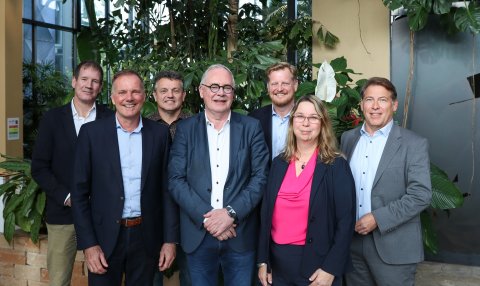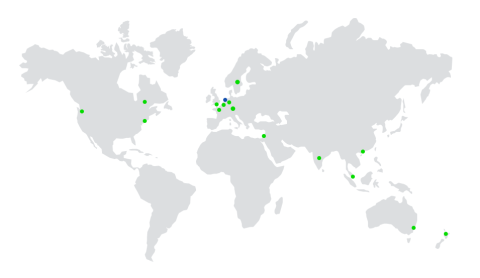
In its “Green Quadrant® Integrated Workplace Management Systems” report, independent research firm Verdantix shares insight into the development of Integrated Workplace Management System (IWMS) solutions over the past years, and in the years to come. Verdantix also highlights six strategies IWMS vendors have recently been implementing. In this blog, we elaborate on each of these six and how Planon integrates these strategies into their processes.
Where are we coming from?
According to Verdantix, “IWMS solutions started in the late 1980s to support the collection, centralization, and reporting of real estate and facilities management data in a more consistent format. Through the early 2000s, IWMS solutions became broader as vendors sought to bring together a larger number of applications on a single platform.”
In the coming years, the IWMS market is going to change, as it “is entering an exciting new phase, marked by a further convergence of solutions supported by a slew of investment and mergers and acquisitions activity and technology advances particularly related to the Internet of Things (IoT). This new phase also brings some risks for buyers of solutions as the vendors follow very different strategies.”
Six strategies for IWMS vendors to implement
In their report “Green Quadrant® Integrated Workplace Management Systems”, Verdantix shared six strategies IWMS vendors have recently been implementing that will shape the IWMS landscape in the years to come. We share thoughts on each of these to give you more insight into how Planon is aiming to improve its IWMS platform every day.
1. “Vendors are racing to deliver the most complete software for real estate and facilities management”
Through Planon Universe (our IWMS platform) we aim to optimize workplace performance by simplifying and connecting various business processes. This will result in lower costs during every phase of the real estate lifecycle, including contract management, maintaining the building, and optimizing space usage to meeting corporate sustainability objectives. Planon Universe is what we call ”integrated by design”, as we strongly believe in building our software from scratch and acquisitions on core applications often turn out to be problematic. These types of acquisitions are similar to building a house using both DUPLO and original LEGO pieces. Just as it would take an enormous amount of time and effort to create a house out of two very different types of LEGO pieces, it is almost impossible to effectively and efficiently integrate two applications which were designed with different philosophies. It simple does not work.
2. “User interfaces are becoming a major focal point to create widespread usage amongst building occupiers.”
Planon invests highly in user interaction and has its own User Experience Design team that is fully focused on optimizing the usability of our software and user interfaces. To make our platform as relevant as possible for different user perspectives, we distinguish different roles within the software itself. We support management roles with specific user interactions (often in reporting and BI). CRE & FM professionals are provided with specific toolsets within their business domain to optimize their processes. We help field engineers in their daily operations with Planon Mobile Field Services, which has its own interaction design. The workforce itself benefits from self-service functionality such as Planon Self-Service, was although launched more than a decade ago is continuously optimized in user interaction to simplify its use.
3. “Vendors are pursuing different roles in the emerging technology stack to leverage the IoT.”
Planon has a dual strategy when it comes to the Internet of Things. These days, affordable sensors are available that, for example, support maintenance processing or measuring workplace occupancy. With Planon Agile Workplace Management we provide a full delivery, out-of-the-box solution, from sensoring to the infrastructure itself. In addition to that (especially in a time technology is evolving exponentially) Planon follows a proactive partner strategy and is expanding its IWMS platform to interact with parties that deliver both hardware and IoT communication infrastructures. Following this strategy, Planon gives its customers the chance to work with, and benefit from all sorts of new and existing IoT technology. Through interaction with the Planon software, it is guaranteed data from different IoT infrastructures is transformed into simple business information which can be used effectively on our platform.
4. “Space utilization improvements re-invigorating the business case for IWMS solutions.”
Planon perceives the workplace as the tangible product of space. Square meters of space will not tell you anything, actual workplaces do. When it comes to space and workplace management, Planon Universe gives insight into three areas: workplace capacity, workplace experience, and cost of ownership. Workplace capacity provides a clear overview of the number of workplaces available. Workplace experience gives insights into the quality of these workplaces when it comes to healthiness or wellbeing. Cost of ownership involves the actual costs per workplace.
5. “Software partnerships are providing IWMS access to best-of-breed functionality.”
As I mentioned earlier, Planon has expanded its platform for third party technology, beyond the technologies of IoT. We prefer to speak about the evolution from an IWMS towards an I²WMS. The traditional ”I” of IWMS stands for ”Business Integration” (combining data and creating business information out of it for the various professionals in RE and FM). A new ”I” makes an entry, ultimately multiplying Integration with this new “I”: Interaction, allowing customers to not only use third party technologies, but to interact with them as well. Planon has already brought I²WMS into practice and has started collaborating with various technology vendors. This results into successful partnerships. For example, Autodesk reseller Cadac Group, for example, enriched the Planon software with its sophisticated BIM technology.
6. “Vendors are expanding their target markets to encompass building owners, building occupiers and service providers.”
Planon was the first IWMS vendor that started working on the development of a platform especially targeted at facilities management service providers (supply), in addition to its existing IWMS solution which was primarily aimed at owner/occupier types of organizations (demand). This resulted in the development of Planon Facility Services Business Solution, having its own specific capabilities, processes and data in place, is supported by a specific staff of consultants and support teams.
If you would like to learn more about Planon’s vision towards the future, in which I²WMS becomes the new standard, I recommend watching our webinar ”How technology enables Real Time Personalisation in the workplace” on-demand.




















